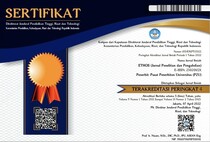Game-Based Learning Media Training for Early Childhood for 21st-Century Teachers
DOI:
https://doi.org/10.29313/ethos.v12i1.3181Keywords:
storytelling media, visual communication, creative learning, digital technologyAbstract
Abstract. To be able to carry out learning in the digital era, teachers must be literate in technology and information. We are currently in the era of the Industrial Revolution 4.0, which demands harmony between humans and information technology in finding solutions to various problems and creating creative and innovative opportunities. One of the competencies of 21st-century teachers is to develop interactive learning media based on digital technology. However, the reality in the field is that there are limited facilities and infrastructure, so there needs to be another motivation to develop ICT in the learning process of early childhood education (PAUD). This activity uses the Participatory Action Research (PAR) method, which is a transformative approach that aims to solve problems and fulfill the orientation on empowerment and practical needs of community change. The training participants are representatives of PAUD teachers in the Astanaanyar sub-district, under the coordination of the POKJA Bunda PAUD Astana Anyar sub-district. The result of this training is the increased ability of teachers to develop learning media in the form of games using the PowerPoint program, commonly known as a presentation application.
References
Amrizal, A., Tukino, T., & Harman, R. (2021). PKM Pelatihan Microsoft Office 2016 yang Efektif dan Efisien pada HIMPAUDI di Kecamatan Batam Kota. PUAN INDONESIA, 3(1), 29–40. https://doi.org/10.37296/JPI.V3I1.58
Chairilsyah, D., & Chairilsyah, D. (2022). Improving Language Skills for Early Childhood. Jurnal Pajar (Pendidikan Dan Pengajaran), 6(2), 418–425. https://doi.org/10.33578/pjr.v6i2.8559
Claudia, C., Prabawati, H., Malihah, M., Novrezi, M., Sahara, S., Safitri, D., & Studi DIII Hubungan Masyarakat, P. (2020). Pelatihan Pendidikan Karakter pada Anak Pekerja di Yayaysan Swara Peduli Indonesia Jakarta. ETHOS: Jurnal Penelitian Dan Pengabdian Kepada Masyarakat, 8(1), 1–8. https://doi.org/10.29313/ETHOS.V8I1.4909
Cornish, F., Breton, N., Moreno-Tabarez, U., Delgado, J., Rua, M., de-Graft Aikins, A., & Hodgetts, D. (2023). Participatory action research. Nature Reviews Methods Primers 2023 3:1, 3(1), 1–14. https://doi.org/10.1038/s43586-023-00214-1
Darmawan, F., Hakim, A., & Sevtiany, V. (2023). Inkscape Training for Teacher Raudhatul Athfal to Grow the Teacherpreneur Spirit. ETHOS: Jurnal Penelitian Dan Pengabdian Kepada Masyarakat, 11(1), 63–70. https://doi.org/10.29313/ETHOS.V11I1.10896
Hafil, M. (2018). Mendikbud Ungkap cara Hadapi Revolusi 4.0 di Pendidikan. https://www. Republika.Co.Id.
Hidayati, T. (2022). Integrating ICT in English Language Teaching and Learning in Indonesia. JEELS (Journal of English Education and Linguistics Studies), 3(1), 38–61. https://doi.org/10.30762/ JEELS.V3I1.173
Iswan, & Wicaksono, D. (2020). Teacherpreneurship dalam Merdeka Belajar. PT Rajagrafindo Persada. http://repository.umj.ac.id/5379/1/Teacherpreneurship%20%28Final%29.pdf
Marianingsih, P., Putri, R. S. A., Aliani, D., Kamila, A. T., Usman, U., Amelia, E., Hodijah, S. R. N., & Leksono, S. M. (2021). Development of Fructuweb “A Learning Website of Banten’s Exotic Fruits” to Support Local Potential-Based Learning in Digital Era. Jurnal Penelitian Dan Pembelajaran IPA, 7(1), 66–83. https://doi.org/10.30870/JPPI.V7I1.9588
Mulyatiningsih, E. (2016). Efektivitas model amovie untuk meningkatkan kemampuan teacherpreneur. Jurnal Penelitian Dan Evaluasi Pendidikan, 20(2), 156–165. https://doi.org/ 10.21831/pep.v20i2.7826
Rama, Mr. (2022). The advantages of Implementing ICT IN Teacher Education. International Journal of Multidisciplinary Research and Growth Evaluation, 217–219. https://doi.org/ 10.54660/ANFO.2022.3.6.6
Saudale, M., Astawan, I. G., & Paramita, M. V. A. (2022). Metode Game Edukasi Berbasis Power Point Interaktif Dalam Pengembangan Bahasa Pada Anak Usia Dini. Jurnal Bimbingan Dan Konseling Indonesia, 7(3), 466–472. https://doi.org/10.23887/JURNAL_BK.V7I3.1514
Servasr. (2018). Metode pendidikan baru menghadapi revolusi industri 4.0. CNN Indonesia. https://www.cnnindonesia.com/gaya-hidup/20180904182901-284-327637/metode-pendidikan-baru-menghadapi-revolusi-industri-40
Suprihatin, S., & Manik, Y. M. (2020). Guru Menginovasi Bahan Ajar Sebagai Langkah Untuk Meningkatkan Hasil Belajar Siswa. PROMOSI: Jurnal Program Studi Pendidikan Ekonomi, 8(1), 65–72. https://doi.org/10.24127/PRO.V8I1.2868
Suyanto, S. (2012). Pendidikan Karakter untuk Anak Usia Dini. In Jurnal Pendididkan Anak (Vol. 1, Issue 1). https://doi.org/https://doi.org/10.21831/jpa.v1i1.2898
Tulasih, S., Yussof, H. B., & Kristiawan, M. (2022). Stimulation of Language Skills for Early Childhood through the Picture Story Method. Bulletin of Early Childhood, 1(1), 42–57. https://doi.org/10.51278/BEC.V1I1.423
Winarni, R. (ed). (2018). Prosiding Seminar Nasional Pendidikan “Strategi Pengembangan Pendidikan di Era Disrupsi.” Institutional Repository Universitas Sebelas Maret. https://digilib.uns.ac.id/ dokumen/detail/73028/Prosiding-Seminar-Nasional-Pendidikan-Strategi- Pengembangan-Pendidikan- di-Era-Disrupsi
Zakiyah, Z., & Chotijah, U. (2023). Pengembangan Game Edukasi Berbasis Web Untuk Anak Usia Dini Dengan Construct 2. Jurnal Nasional Komputasi Dan Teknologi Informasi (JNKTI), 6(3), 287–293. https://ojs.serambimekkah.ac.id/jnkti/article/view/6213

















